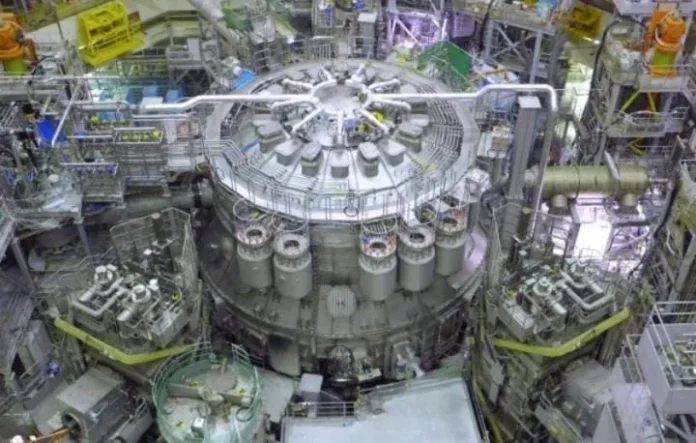Japan’s Monumental Stride in Nuclear Fusion: JT60SA Reactor Inaugurated
In a groundbreaking development, Japan unveiled the world’s largest experimental nuclear fusion reactor at Naka on December 1, marking a significant leap in the exploration of nuclear fusion technology. While still in its early stages, nuclear fusion is hailed by many as a potential solution to humanity’s future energy requirements. This cutting-edge JT60SA reactor stands as a testament to Japan’s commitment to advancing fusion technology.
Aims and Feasibility of Fusion Energy
The primary objective of the JT60SA reactor is to assess the feasibility of fusion as a safe, large-scale, and carbon-free source of net energy, aiming to generate more energy than is invested in the production process. The innovative “tokamak” vessel, housed in a six-storey-high structure in Naka, is designed to contain swirling plasma heated up to an astonishing 200 million degrees Celsius (360 million degrees Fahrenheit).
Fusion vs. Fission: Safety and Reduced Radioactive Waste
Distinguishing itself from fission, fusion carries no risk of catastrophic nuclear accidents and significantly reduces the production of radioactive waste compared to conventional power plants. This fundamental shift in approach has the potential to redefine the safety and environmental impact of nuclear energy.
International Collaboration: The Power of Unity
The JT60SA project is the result of a collaborative effort involving over 500 scientists and engineers, along with the active participation of more than 70 companies from both Europe and Japan. This fusion reactor, a testament to global cooperation, has the potential to emerge as a pivotal component in the future energy landscape.
Mimicking the Sun’s Energy Generation
The core principle of nuclear fusion involves coaxing hydrogen nuclei to fuse into a single, heavier element—helium. This transformative process releases energy in the form of light and heat, closely emulating the energy generation mechanism within the Sun. The aspirations of the JT60SA project align with those of its forerunner, the International Thermonuclear Experimental Reactor (ITER) in France, collectively pushing the boundaries of fusion technology.
Fusion’s Role in the Energy Mix
Sam Davis, deputy project leader for the JT-60SA, expressed optimism about the reactor bringing humanity “closer to fusion energy.” EU energy commissioner Kadri Simson echoed this sentiment, labeling the JT-60SA as “the most advanced tokamak in the world” and highlighting its potential to become a crucial element in the global energy mix by the latter half of the century.
A Landmark Achievement and Global Implications
The achievement of “net energy gain” in nuclear fusion, previously realized at the National Ignition Facility in the United States, has been recognized as a “landmark achievement.” Governments worldwide see it as a pivotal step towards achieving a source of unlimited, clean power and reducing dependence on carbon-emitting fossil fuels, mitigating both climate change and geopolitical challenges.
Sources: The Japan Times, The Guardian
Article by freelance reporter for True To Life.
